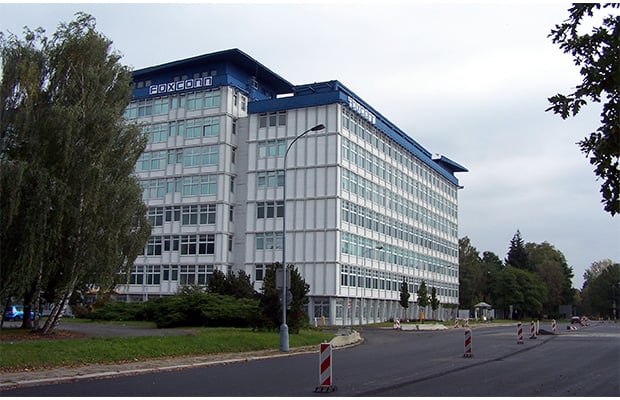Foxconn Has Visions Of Robot Overlords Taking Over, But Human Workers Still Matter (For Now)
Foxconn is one of the biggest manufacturers of Apple's iPhone handsets, along with electronic gadgets and gizmos from various other well known companies, and for now, all those devices still require a human element. However, that might not always be the case as Foxconn dives deeper in robotics.
What you may not realize is that Foxconn has been developing robotics technology for over a decade. The company's efforts have mostly flown under the radar, though it gained attention when its Japanese partner SoftBank trotted out a humanoid service robot called Pepper. That was in 2014.

Foxconn's robots are, appropriately enough, called Foxbots. They don't resemble humans even though they're replacing flesh and blood workers in certain areas. Instead, they consist of mechanical arms designed to tackle low level and repetitive tasks. The appeal is that they're highly precise, so product quality goes up a notch, and they're cheaper than human labor in the long run.
"Automation enables employees to focus on higher-value work and frees them from more mundane tasks, improves product quality and consistency, reduces manufacturing cycle time, and reduces in-process inventory," Foxconn relayed to Nikkei Asian Review in a written statement.

Not everyone will be stoked about robotics taking the place of humans in the workplace, though for Foxconn, tasking Foxbots with mundane tasks might allow the company to improve overall working conditions. Foxconn came under heavy scrutiny a few years ago when there was a rash of employee suicides amid reports of forced overtime and low pay.
Foxconn doesn't anticipate a fully automated workforce. As it stands now, and for the foreseeable future, Foxconn uses a mix of automated stations and human workers for electronic assembly.
What you may not realize is that Foxconn has been developing robotics technology for over a decade. The company's efforts have mostly flown under the radar, though it gained attention when its Japanese partner SoftBank trotted out a humanoid service robot called Pepper. That was in 2014.

Foxconn's robots are, appropriately enough, called Foxbots. They don't resemble humans even though they're replacing flesh and blood workers in certain areas. Instead, they consist of mechanical arms designed to tackle low level and repetitive tasks. The appeal is that they're highly precise, so product quality goes up a notch, and they're cheaper than human labor in the long run.
"Automation enables employees to focus on higher-value work and frees them from more mundane tasks, improves product quality and consistency, reduces manufacturing cycle time, and reduces in-process inventory," Foxconn relayed to Nikkei Asian Review in a written statement.

Not everyone will be stoked about robotics taking the place of humans in the workplace, though for Foxconn, tasking Foxbots with mundane tasks might allow the company to improve overall working conditions. Foxconn came under heavy scrutiny a few years ago when there was a rash of employee suicides amid reports of forced overtime and low pay.
Foxconn doesn't anticipate a fully automated workforce. As it stands now, and for the foreseeable future, Foxconn uses a mix of automated stations and human workers for electronic assembly.

